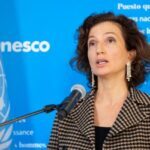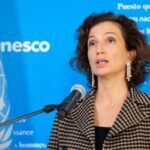The United Nations Educational, Scientific and Cultural Organisation (UNESCO) has called on its Member States to develop tailored assistance to protect and promote artistic freedom in emergency situations. It has also announced a new investment of US$1 million to finance projects supporting artistic freedom in over 25 countries. These announcements are contained in a report titled “Defending Creative Voices”, published to commemorate the World Summit on Arts and Culture, held on May 4, 2023
The call was made in a report titled Defending Creative Voices published to commemorate the World Summit on Arts & Culture held on May 4, 2023. It highlights that emergency situations such as armed conflict, unstable political contexts and natural disasters exacerbate the pre-existing vulnerabilities that artists face including threats such as online and offline harassment, brutal loss of income, legal prosecution, violence, censorship, and silencing noting that the artists often lack minimal safety nets due to the precarious legal status.
The report recommends that the international community-tailored assistance it urged states to develop should be built on UNESCO’s experience in protecting artists during conflicts – most recently in Iraq, Ukraine, and Yemen. The organisation said states could also capitalize on best practices concerning press freedom for which a global action plan has been implemented by it for more than ten years.
In particular, the report suggests UN-wide monitoring of the artistic freedom in emergency context, that recognizes artists as a vulnerable group in need of specific attention; a collaborative support programme for the safety of artist, and the protection of both artworks and cultural spaces in emergency contexts; and tailored capacity building of judicial and legal actors to protect artists through investigations and prosecutions.
To improve the resilience of artists in emergency context, the report also recommends stronger legal frameworks, with better legal recognition of the status of the artist. In this area, UNESCO announced the investment of an additional US$1 million from the UNESCO-Aschberg Programme to finance projects in over 25 countries with 13 of these projects led by governments and 12 others by NGOs.
Governments that will benefit from technical assistance to develop laws, regulations or policies in favour of artistic freedom, decent works and enhanced status for artists and culture professionals are: Argentina, Côte d’Ivoire, Chile, Djibouti, Ghana, Kenya, Malawi, Namibia, Niger, Mongolia, Senegal, and Zimbabwe. Member countries of CECC-SICA (Costa Rica, Belize, Dominican Republic, El Salvador, Guatemala, Honduras, Nicaragua and Panama) will also benefit from this legal assistance.
Civil society organizations that will benefit from financial assistance to undertake training, advocacy, monitoring or research on artistic freedom and the status of the artist are: Valerian Gunia Union of Young Theatre Artists (Georgia), Instituto Pensar (Brazil), CICADA (Cambodia), PEN International (Kenya, Malawi, South Africa, Uganda, Zambia), Gerar–The Creative Hub (Ethiopia), Association for the Defence of Women and Peoples (Angola), Culture-Developpement (Togo), Ikirenga Artistic Freedom Initiative (Rwanda), Meemz Arts Initiative (Yemen), Action for Hope (Sudan, South Sudan), Safe Havens (global) and Freemuse (global).







